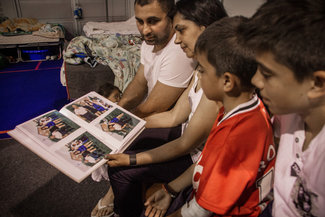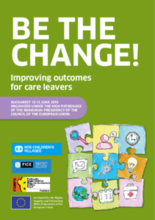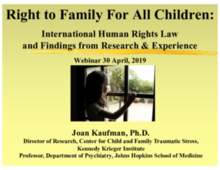

Displaying 571 - 580 of 1071
“BE THE CHANGE! Partnering to improve the transition from alternative care to independent living” will be held in Bucharest from 12-13 June 2019.
This report from SOS Children's Villages describes the Leaving Care Project, a project that was set up to develop and implement a state-of-the-art training programme for care professionals who work directly with young people leaving care in order to equip them with the skills, knowledge and tools they need to work with young people in transition.
Pese a que hay un consenso sobre la importancia del cuidado efectivo en las familias para los niños, existe una falta de discusión y acuerdo sobre los componentes precisos de este cuidado. Este informe contribuye a debatir sobre este importante tema al proporcionar perspectivas de los grupos focales con 198 niños y 81 adultos de Brasil, Colombia, Egipto, México, Rusia, Ruanda y Zimbabue.
There is extensive research demonstrating clearly the importance of a safe and caring family for child wellbeing and development. While there is consensus on the importance of effective care in families for children, there is a lack of discussion and agreement about the precise components of this care. This report contributes to debates on the components of family care by providing perspectives from nearly 200 children and over 80 adults from Brazil, Colombia, Egypt, Mexico, Russia, Rwanda and Zimbabwe. The report demonstrates that there are many commonalities in perspectives on and experiences of care across contexts.
In this article, the authors present findings from a follow‐up assessment from the Bucharest Early Intervention Project (BEIP) - the first longitudinal study to investigate the neurodevelopment of institutionalized infants randomized to a foster care (FCG) intervention versus care as usual (CAUG)- of brain electrical activity as indexed by resting EEG at age 16 years.
In a sample of 136 Romanian children from the Bucharest Early Intervention Project (BEIP), who were exposed to early psychosocial deprivation in the form of institutional care, the authors of this study examined caregiver-reported and observer-rated signs of disinhibited social engagement disorder (DSED).
This presentation, given at Disability Rights International and the European Network on Independent Living's webinar on the right of all children to a family, outlines the Consensus Statement Position on Group Care for Children and Adolescents of the American Orthopsychiatric Association and reviews the research on the detrimental effects of institutionalization on children from the Bucharest Early Intervention Project and other studies.
This paper presents an overview of ChildHub, a peer learning and capacity-building network for child protection professionals initially developed and deployed in South-East Europe, and outlines a proposal for contextualizing ChildHub to Africa and South Asia.
This study, part of the Bucharest Early Intervention Project, compared the consequences of long-term high-quality foster care versus standard institution-based care which began in early childhood on cardiometabolic and immune markers assessed at the time of adolescence.
This theoretical-empirical study is based on two particular case studies of families bringing up children from institutional care in Slovakia.




